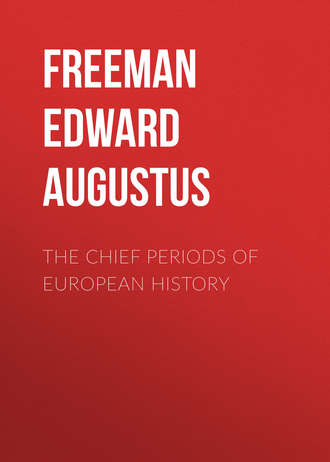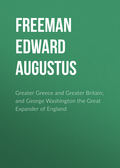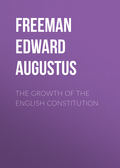
Freeman Edward Augustus
The Chief Periods of European History
LECTURE IV.
THE DIVIDED EMPIRE
The most renowned of my predecessors in this chair, in planning that History of Rome which unhappily remained a fragment, but which gave to the world in its last finished volume the very perfection of historical narrative, designed to carry on his work to the coronation of Charles the Great. The reading and thought of forty years have ever more and more convinced me of the wisdom of Arnold’s choice. The year 800 was not, any more than the year 476, the end of the Roman Empire; it is not, any more than the year 476, a boundary between “Ancient” and “Modern” History. But it is one of the most marked turning-points in the history of the Empire and of the world, a turning-point of immeasureably greater moment than the consulship of Basiliscus and Armatus. The election of the first Charles changed the face of the world far more than the deposition of the last Romulus. Of a History of Rome such as Arnold planned, it was, as the wise instinct of Arnold saw, the fitting ending. The election of Charles did, in outward show, restore the Old Rome to her old position. She again became, if not the dwelling-place, at least the crowning-place, of Emperors. In truth the Old Rome had never before beheld the ancient Hebrew rite which, from the fifth century onwards, had become familiar in the New. For a thousand years longer the titles of her Empire went on; for seven hundred years longer they could be won only before the altar of the Vatican basilica. For full five hundred years longer the Roman Empire of the West was, as such, a living thing, a thing that influenced the minds and acts of men, a mighty fact, a still mightier theory. But in the West the Emperor of the Romans had less and less to do with the Old Rome. To his Imperial capital he gradually became a stranger, and his capital became a city of strangers to him. In short, the Roman power in the West altogether passed away, not only from the Roman city, but from the artificial Roman nation. When Rome again asserted her right to choose her sovereign, she chose, she could not fail to choose, a man who was not Roman even by adoption. She chose the Frankish king. Pippin had been Patrician; so had Ricimer; so had Odowakar. But the son of Pippin bore a loftier style. The long-abiding tradition was broken through; a barbarian received the diadem; the Roman Pontiff spoke the words, and the Roman people echoed them – “Karolo Augusto, a Deo coronato, magno et pacifico Romanorum Imperatori, vita et victoria.” The German was at last Augustus. No greater witness could there be to the moral conquest which each race had won over the other. The Empire now in form received its greatest territorial enlargement. Gaul was won back and Germany was added. Wherever the Frankish king had before ruled as king, he now ruled as Emperor. Terminus advanced to the Elbe and the Eider; he was ready to advance to the Oder and the Vistula, or, if need should be, to the world’s end. All unreal, all nominal, some objector will cry; an advance, not of Rome, but of Germany, an advance, not of the Roman Augustus, but of the Frankish king. And truly the Empire of Charles, much more the Empire of the Henries and Fredericks, was unreal in this, that it was assuredly a very different thing from the Empire of Trajan or of Diocletian. It was assuredly not Roman in the sense in which the Empire even of Theodosius was Roman. But here lies the greatest proof of the influence of Rome, of her magic power over the minds of men, that a power which had practically ceased to be Roman, should still be Roman in men’s eyes, and, as Roman, should command a reverence, a devotion, a bowing down as it were of the whole soul, which could be called forth by no other name. A name may have lost its first meaning; but, as long as men will fight and die for the name, the name is a fact indeed.
The act of 800, it must always be borne in mind, was in one sense the repetition, in another sense the undoing, of the act of 476; but it was in no case the revival of the line of Emperors which came to an end in 476. Charles, Emperor of the Romans, was not the successor after a long interval either of Romulus Augustulus or of Julius Nepos; he was the immediate successor of Constantine the Sixth. The Emperors had lost all practical authority in Rome earlier in the century; their power had passed to the Frank. Charles Augustus received no powers which he had not already exercised as Patrician; only hitherto the titles of sovereignty had been left to the Emperor beyond the sea. The name now went with the reality; the titles and badges of Empire were transferred to the new Emperor reigning at Rome, at least crowned and anointed at Rome. There was no need to depose any reigning sovereign. Rome had acknowledged Constantine; she refused to acknowledge Eirênê; the Empire could not be held by a woman, least of all by a woman who had deposed and blinded her own son. There was again an interregnum, such as had followed the death of Romulus and the death of Aurelian; that interregnum was ended by the election of Charles. In Western theory no doubt, Charles himself, and each of his successors, was elected to the sovereignty of the whole Empire; he was to reign, if he could, over the New Rome as well as over the Old. In Eastern theory no doubt the election and coronation were null and void; the Emperor anointed in Saint Sophia had a right which none could take away to reign over the Old Rome as well as over the New. Each Emperor in short asserted himself to be the one true Emperor and the other to be an impostor or a tyrant. The dispute was for some centuries stirred up afresh from time to time at some moment favourable for its discussion. To men zealous for Eastern rights the Western claimant was a mere Ἀλαμανῶν ῥήξ; to men zealous for Western rights the Eastern claimant was nothing loftier than “Rex Græciæ.” The most curious piece of discussion on the subject is the memorable controversy, waged by or invented for Basil of the East and Lewis of the West, while the grounds of the dispute were still fresh. It was a moment of pride for Charles the Great himself when Nikêphoros waived his claim to universal rule, when he admitted the Frankish king as his equal and bade his ambassadors adore him as Imperator and βασιλεύς. A conflict of claims like this, in which each of the two greatest princes of Christendom gave himself out to be the one head of Christendom, might have been expected to lead to something more than constant disputes and jealousies; it might have been expected to lead to constant wars. As a matter of fact, formal wars between the two Empires were not common; there was little to gain by them on either side. But rivalry and ill-feeling went on between the princes of the West and of the East, between the men of the West and of the East, to the great damage of Christendom in more than one hour of need.
The truest view of the event of 800 is that the existing Empire was split asunder, and that the western fragment, that which acknowledged the Frankish king as its Emperor, was in form enlarged by the addition of the territories of the Frankish king. The Empire was now really split asunder; it was split asunder between two rivals, each of whom held himself to be the one lawful representative of their common predecessors. This state of things must not be confounded with the state of things in the fifth century. The Empire was now divided in quite another way from that in which it had been divided between the sons of Theodosius. The division between the sons of Theodosius did not differ in form from the division between the sons of Constantine or the earlier division between Diocletian and Maximian. The division between Arcadius and Honorius, and the Emperors who followed them in the fifth century, was a division by consent; the administration of a single Empire was divided, as it had often been before, between two Imperial colleagues. But now it was divided between two rival potentates, each of whom was in theory bound to deny the rights of the other. Then the West was often willing to accept the prince named by the Emperor who reigned over the East; now assuredly no prince named by the lord of Constantinople, the “rex Græciæ,” would have been admitted to royal and imperial unction at Aachen, at Milan, and at Rome. But mark further that the Western division, the Western Empire, was not only parted from the Eastern, but was enlarged by the addition of new territories, over a great part of which no Emperor had ever reigned before. If Charles had kept his Frankish and Lombard kingdoms distinct from his Roman Empire, the last would have consisted only of Rome and Ravenna and the lands about those cities. No one so well deserved the somewhat grotesque title of his later successors, “zu allen Zeiten Mehrer des Reichs,” as the first Emperor who could have understood his own description in any Teutonic tongue. Charles, as I said earlier in these lectures, annexed the lands which Drusus and Germanicus had failed to annex. But to what did he annex them? Assuredly to something very different from the Empire of the first Augustus, to something very different from that western half of the Empire of Augustus which had been reigned over by Maximian and Valentinian. And the effect of the annexation was widely different from what it would have been if it had been made either by Drusus or by Valentinian. The main difference lies in this, that whatever was annexed to the Empire at either of the earlier times was forthwith added to the artificial Roman nation that was growing up, while the inclusion of the whole dominions of Charles within the Empire, though it still carried with it an extension of Roman influences, in no way carried with it any extension of an artificial Roman nation. The new subjects of the Roman Empire, the inhabitants of Gaul and Germany, assuredly did not feel that they had become Romans. The election of Charles to the Empire, the annexation of all his dominions to the Empire, did far more to make the Empire German than it did to make Germany Roman. The Roman style of the Empire is still very much more than a name; its Roman traditions are still very much more than mere words; it is still by its abiding Roman character that it keeps its influence over the minds of men. But it is now altogether divorced from any practical connexion with the Roman city and with the Roman nation. It was nothing new that Emperors should be made elsewhere than in Rome; that discovery was made before the first century of the Empire ended. But the Emperors so made were Romans, Roman in speech, Roman at one stage by real citizenship, at another by artificial nationality. It was something new that Rome should be the crowning-place, and only the crowning-place, of Emperors who were Roman in no sense but that of being Roman Emperors. The Emperor was Romanorum Imperator to the last; but who were the Romani? Were they the inhabitants of the Empire as a body? The mass of them would assuredly have disclaimed the Roman name. Or had the name fallen back on its elder and narrower senses in which it meant only the people of the Roman city? But in Rome itself the authority of the Roman Emperor passed away more thoroughly and more formally than elsewhere. The Imperator and the Pontifex Maximus had long ceased to be the same, and in Rome the Pontifex Maximus of the new faith had become the true local sovereign. For ages the Imperator came to Rome only to become Imperator, and then to go away. At last, when the succession begun by Charles was drawing near its thousandth year, an Imperator electus came to Rome, and went away without winning the right to cast aside his qualifying adjective.
The truest description of the Western Empire during the thousand years from the first Charles to the last Francis is that which sounds so like a contradiction, “the Holy Roman Empire of the German Nation.” It remained by the strictest continuity a Roman Empire; once accept the position of the Western Emperors as against the Eastern, and no flaw can be found in the whole succession. But the Roman Empire had become a possession of the German nation; German electors chose a German king, and the German king had a right to receive his consecration as Roman Emperor without any further questions being asked.
“Ex quo Romanum nostra virtute redemptum,
Hostibus expulsis, ad nos justissimus ordo
Transtulit imperium, Romani gloria regni
Nos penes est: quemcumque sibi Germania regem
Præficit, hunc dives submisso vertice Roma
Suscipit, et verso Tiberim regit ordine Rhenus.”
An older form of the same idea is found in the phrase which spoke of the translation of the Empire from the Greeks to the Franks. Translated to the Franks, the Empire, as concerns the West, assuredly was; and, on the Western theory, it may in a sense be said to be translated from the Greeks. A line of Emperors whose native speech was German succeeded, in Western ideas, a line of Emperors whose native speech was Greek. Yet the phrase will not stand every test. The words “Greek” and “Frank,” as used in the formula, do not exactly answer to one another. A man of the East, if he could have brought himself to allow that the Empire had been translated at all from his own side of Hadria, would have said that the formula should rather speak of a translation of the Empire from the Romans to the Franks. But no one in the West would have thought of saying that the Empire was translated from the Greeks to the Romans. We have just heard the Western Empire called, with national pride, a Holy Roman Empire of the German Nation. But no national pride could have been called up by speaking of the Eastern Empire as a Holy Roman Empire of the Greek nation. For “German” was a national name in which the men of the Western Empire gloried; “Greek” was a name which no man of the Eastern Empire admitted to belong to him. It is perfectly true that the two Empires did in the end become, the one a German, the other a Greek state. But they became German and Greek in different senses and by different processes. We see at once that the Western Empire became German through the election of a German king to its crown. It seems ridiculous to speak, even for the sake of pointing the contrast, of the Eastern Empire becoming Greek by the election of a Greek king to its crown. Something like that might happen in the nineteenth century; it could not possibly happen in the ninth. We may here bring in the analogy and the contrast of which I spoke at the end of our last lecture. The nearest analogy to be found in the East to the Empire of Charles the Frank would have been if Bulgarian Simeon or Servian Stephen had been crowned Emperor of the Romans in Saint Sophia and had from that moment reigned over Bulgaria or Servia in his character of Emperor of the Romans. But the nearest approach to this was when the Tzar Simeon and the Tzar Stephen took an Imperial style without entering the walls of the Tzarigrad. That such was the nearest approach in the East to the event of the year 800 is the most marked point of difference between the positions of the Teuton in the West and the Slave in the East. One main reason why it was the nearest approach lies in the different positions held by the Old and the New Rome in the two Empires. For another main reason we must look a little further.
I said a few minutes back that a man in the East might perhaps have said that the Empire was translated to the Franks from the Romans, but that no man in the West would ever have said that the Empire was translated from the Greeks to the Romans. I said also in my last lecture that one great cause of the different position held by the Teutons in the West and by the Slaves in the East was that the Eastern Empire spoke with two tongues, while the Western Empire spoke with one tongue only. The cause of that difference has to be sought for in far earlier stages of our subject; it is the continuation of the difference which I pointed out long ago between the position of Rome in the East and in the West; the difference that, while in both alike Rome was a ruler, in the West she was also a teacher, while in the East she was herself a learner. In the West Latin displaced the native languages. We may say that no Roman ever learned Celtic or Iberian. If any Roman ever did, it could have been only for some immediate practical purpose. But in the East Latin never displaced Greek; it was not likely to displace, there was no wish that it should displace, a tongue which every educated Roman learned as a matter of course. The tendency was rather the other way. At one stage, as I pointed out in another set of lectures, Greek went far to displace Latin as a literary tongue even in Rome; the later Latin writers, like Ammianus and Claudian, mark in truth a Latin reaction against Greek influences. In the Greek East Greek lived on and flourished; Latin was simply set up by its side for certain purposes. The Roman Empire of course, whether in East or West, knew no official tongue but Latin. Latin therefore remained for ages the tongue of government and warfare in the Roman East, while Greek was the language of ordinary speech, of literature, and of religion. That is to say, the position which belonged to Latin alone in the West was in the East divided between Latin and Greek. It was impossible therefore that either of those tongues should make the same way among other nations which Latin, with its undivided supremacy, made in the West. In those parts of Eastern Europe where Greek had not already established itself, the phænomena of Western Europe showed themselves. In inland Thrace and Mœsia, just as in Gaul and Spain, a Romance speech did spring up, and in the wilder lands of Illyricum, the Skipetar, the modern Albanian, still kept his own speech, like the Basque and the Breton of the West. Thus to the invading Teuton, the culture of the Empire presented itself only in a single shape, a Latin shape, while the invading Slave, if he wished to adopt the culture of the Empire, must have been puzzled by the twofold shape, Greek and Latin, in which it stood before him. It was an almost necessary consequence that neither element ever had the same influence on the Slavonic conquerors of the East which the single Latin element had on the Teutonic conquerors of the West.
I have said that the Roman Empire of the West became by degrees a German power, and that the Roman Empire of the East became by degrees a Greek power. But I have said also that they became so in different ways. We have seen that the Western Empire became German by the process of choosing German kings to its Emperors, and by extending the name of Roman Empire over their German dominions. The Eastern Empire became Greek in quite another way. There was no transfer of Roman power to Greek princes, no extension of the Roman name over Greek lands. Either process might have happened with Slavonic princes and Slavonic lands; neither could happen with Greek princes or Greek lands, for the simple reason that Greek princes and lands, as distinguished from Roman, were not in being. In the Romania of the East, in Eastern Europe and Western Asia, Greek and Roman meant the same thing. We have spoken of an artificial Greek nation and of an artificial Roman nation; in the Eastern Romania they were the same thing. Of the two tongues of the East-Roman world, the tongue which was native to the soil proved the stronger. Latin gradually died out even in its own range; it died out, that is, as a separate speech, though not till it had poured a vast infusion of Latin words into the official Greek vocabulary. Greek became the one language of the Roman Empire of the East; as in the West the Romance languages grew up, while Latin long abode beside them as an official, a literary, and a religious speech, so in the East men spoke a more modern form of the Greek tongue, while its older shape went on as the official, the literary, and the religious speech. But down to the coming of the Ottoman, nay down to the movement of our own century which in some lands has thrown off his yoke, the Roman name lived on. What name in short should supplant it? The name of Hellên had passed away; it had become synonymous with pagan. The Greek name had never been used in the Hellenic lands; it was the name by which the Hellênes were known in the West, exactly as the Deutschen and the Cymry are known among other nations by other names than those by which they call themselves. In truth the people whom the Latins called Græci called themselves at one stage Ἕλληνες and at another Ῥωμαῖοι. The Roman name lived on, and well it might; there was nothing to change it. While the Western part of the Empire was first united to the Eastern and then separated from it, while it was separated from it to pass to one who was first Patrician of the Romans and then Emperor of the Romans, but who would hardly have called himself personally a Roman, the Eastern lands of Rome were ruled in unbroken succession by princes following one another in the same Imperial seat, any one of whom would have been amazed indeed if his right to the Roman name had been disputed. Prince and people alike clave to that name and knew no other; and Romans they were, not in the same sense as the first settlers on the Palatine, not even in the same sense as the Volscian Cicero and the Spaniard Trajan; but in the sense in which their forefathers had become Romans by the edict of Antoninus. They were Romans by the same right as Theodosius when he came as a second Trajan from Spain, as Jovius himself when he came from the land that should be Tzernagora. It would have been hard to find a Roman pedigree for Justinian; but neither would it have been easy to find one for Aurelian. The Greek – not the pure Hellên of old but the Greek of the artificial nation formed by Macedonian conquest – had the same right to the Roman name which the Gaul had; so to be sure had the Syrian and the Egyptian. But then the Syrian and the Egyptian could hardly be said to accept the gift; under the guise of national creeds, creeds that were deemed heretical by the orthodoxy of either Rome, they clave to an elder national being which was neither Greek nor Roman, and they fell away from their Roman allegiance to become not wholly unwilling subjects of the Saracen. The very losses of the Empire, the cutting off of its Eastern provinces, helped, not indeed to make the Empire more Roman, but to make Roman and Greek more thoroughly words of the same meaning within its Eastern provinces. In the course of the seventh century, the Oriental lands of Syria and Egypt, the Latin lands of Spain and Africa, were finally torn away from the Empire. Part of Latin Italy had already passed to the Lombard; the rest now followed it to form the kernel of the new Roman Empire of the West. The result of all this was that, from Sicily to Tauros, the subjects left to the Empire, the Romans of the East, were almost wholly men of Greek speech and of what we have called artificial Greek nationality. Within the Eastern Empire the artificial Greek nation and the artificial Roman nation seemed to have become the same thing. Every Greek was a Roman; it seemed as if every Roman was a Greek. It was not wholly so; even within the Eastern peninsula the Albanian and the Rouman nationalities were still to show themselves. But to all appearance the Roman lands of the East were as purely Greek-speaking lands as the Roman lands of the West were Latin-speaking lands. If the Western Empire became German, it was by choosing a German king and in some sort adopting his German subjects. If the Eastern Empire became Greek, it was because the un-Greek parts were lopped off from it. To this process the finishing stroke was put by the event of 800. Latin Italy then parted, even in name, from its allegiance to the Eastern Rome. The prince who reigned at Constantinople was by the truest political succession Emperor of the Romans; but the Romans who were left for him to rule over were well nigh wholly Greek.
In this way therefore, and largely by virtue of the same act, the Eastern Empire became Greek, while the Western Empire became German. The one became Greek through one of its old elements obtaining an exclusive predominance; the other became German by bringing in an element altogether new. But in becoming severally German and Greek, neither ceased to be Roman. The Roman spirit might die out; but the Roman succession went on; the Roman tradition was never broken. In the East the tie to the Roman past was never snapped; if it passed away, it was because the Romans of the East seemed almost to forget that there had ever been any Romans but themselves or any Rome but their own. In the West, on the other hand, the tie to the Roman past was never formally snapped any more than in the East; but it passed away because it was overshadowed and stifled by the un-Roman institutions that grew up by the side of it. The Augustus of the East was Emperor of the Romans and nothing more; it was strange that the diadem of Jovius should be conferred by a Christian unction, but what the Christian unction of the East did confer was the diadem of Jovius and none other. The Augustus of the West was also King of Germany, of Italy, and of Burgundy; Aachen, Milan, Arles, had their share in making him as well as the Eternal City. Take away the German, the Italian, and the Burgundian realms, and it might be hard to find on the map the lands over which Cæsar ruled purely in his character of Cæsar. Again, in the East, wherever the Emperor reigned at all, he truly reigned. Did the Empire reach once more from Ister to Orontes, from Ararat to Ætna? Was it shut up within a corner of Thrace and a fragment of the coast of Asia? In either case, be the Empire great or small, be its sovereign the mighty Macedonian or the trembling Palaiologos, wherever he was sovereign at all, he was βασιλεύς and αὐτοκράτωρ in the fullest sense. In the West, through the growth of a new set of ideas and institutions, the Emperor, still keeping all his titles, all his formal dignity, still worshipped with a ceremonial only less stately than that of his Eastern brother, gradually sank into a mere chief of unruly feudatories, into a mere President, it might seem, of a Confederation in which every member was stronger than the head. An Eastern Emperor might expect to be slain or blinded to make room for another; but, while he kept his life and his eyes, his will was undisputed. A Western Emperor was commonly free from such extreme changes of fortune. A few only died on the battle-field or by private murder, and those few at least enjoyed the light of heaven till their last moments. But while they reigned, while men called them Lords of the World, Vicars of the Almighty, if they loved the truth of power rather than its show, they might have been tempted to envy the smallest of their vassals who within a few roods of ground did without let or hindrance that which was right in his own eyes.
I have been drawn on, almost in spite of myself, to paint somewhat of a picture of the main features which distinguished the Eastern and Western Empires after they were finally split asunder by the act of the year 800. But a lecture on the Divided Empire ought to do something more. It ought not to shrink from the more prosaic task of sketching the main facts of the story in their order and of speaking a word of warning against a few notions and forms of speech which are likely to mislead. But it may not be useless to run with a swift step through the revolutions of several centuries, and here and there to throw in a needful caution. And to understand the Divided Empire, it is first needful to cast a glance at the Empire before it was divided. We have to hasten as far as the thirteenth century, a century almost as full of destiny as the fifth, but to the fifth we must first again look back. We have seen that at its beginning the formal boundaries of the Empire had hardly given way; Theodosius had reigned over at least as wide a dominion as Jovian; and his dominion had passed to his sons reigning as Imperial colleagues at Constantinople and at Ravenna. In the course of that century the Vandal passes through Gaul into Spain; he founds a Spanish realm, and presently forsakes it for a somewhat more lasting dominion in Africa. The Alan, marching at his side, founds a yet more momentary dominion in Spain and presently vanishes from the face of the earth. The third in that great march, the Suevian, founds his Spanish realm also and keeps it longer than either. At the end of the century he still holds his north-west corner; but the rest of the peninsula is in the hands of the West-Goth, whose mighty kingdom stretches over Gaulish and Spanish ground from the Loire to the pillars of Hercules. The Burgundian has spread himself from his old seat on the Rhine to the mouths of the Rhone and the haven of Massalia. But the Roman name has but lately died away from central and northern Gaul. Cut off from either centre of Imperial rule, a Roman land, some say, strange as the title sounds, a Roman kingdom, has lingered on between Seine and Loire, to yield at last to the advance of a Teutonic people who have long played a secondary part in the affairs of Gaul, but who are now, in the short life-time of a single enterprising king, to spring to a place in the world alongside of the Roman and the Goth. The Frank has begun his march, eastward, westward, southward, northward. For a moment he is the heathen lord of Catholic subjects who preferred the worshipper of Woden to the follower of Arius; he is presently to change into the one Catholic power of the whole world, the eldest son of the Church, looked to through all Gaul as the deliverer of Catholic lands from heretical rulers. And, what concerns us more than all, while Gaul, Spain, Africa, have passed away from the Empire, Italy and Rome itself have, in all but name, passed away with them. One barbarian patrician has yielded to another; Theodoric watches over Italy as no Cæsar had watched over it for many a year. A few years more, and his rule stretches, under one title or another, over the whole western half of the Mediterranean lands of Europe. Yet the Roman name, the Roman power, lives on in its Eastern half; the one Emperor of the Romans still holds his throne in the Eastern Rome, keeping but the shadow of a barren title over his elder capital, but biding his time to make that shadow a reality at the first favourable moment.







